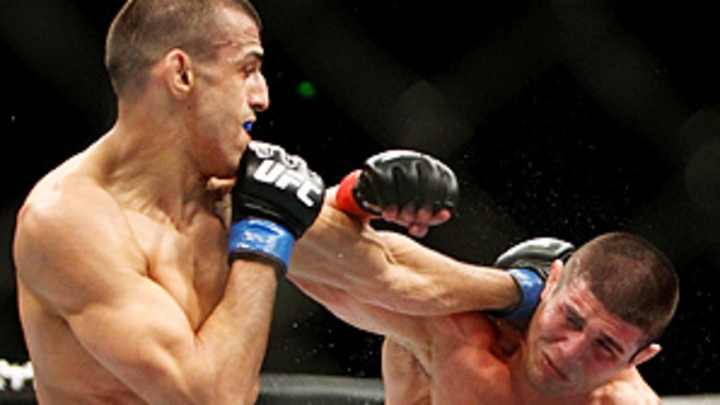For struggling fighters, a change in weight class is rarely the answer


Look around Sunday night's UFC Live fight card long enough and you might start to wonder whether Weight Watchers is the newest UFC sponsor. From Nate Marquardt to Tyson Griffin to Joe Stevenson, it seems like everyone is slimming down and dropping weight classes.
Why? That depends whom you ask. Marquardt says he's doing it because he was already a small middleweight to begin with, so why not tighten up the diet to move down and fight smaller opponents?
Stevenson and Griffin, on the other hand, are both riding three-fight losing streaks, so it's no secret what they're after. They want the cure. They want a fix for whatever it is that's got them on a downward spiral, and they've zeroed in on weight class as the likely culprit. Now they'll just cut down on calories, suck down to a new division and, voilà, good as new.
Only that's not always how it works, unfortunately.
A fighter has to tell himself something when he hits a rough patch like the one through which Stevenson and Griffin have been slogging. He has to identify a problem that he can fix, something that's within his control. If he just throws up his hands and admits that he's getting too old, too slow or too predictable for the more evolved fighters coming up to take his spot, he's done. Psychologically, at least, he has to pinpoint an issue he can actually do something about, which is why weight is such a popular choice.
It's an attractive notion, when you think about it from the fighter's perspective. You tell yourself that it's not your skills that are to blame -- you just need to pick on someone your own size. Or, preferably, maybe someone just a little bit smaller.
Every once in a while, they're right. Griffin had a lot of success as a featherweight at the beginning of his career, but the UFC didn't feature the division until very recently, so the money was at lightweight.
Stevenson has never fought at 145 pounds, but he's always been on the small side at 155 pounds, so why not give it a shot after three consecutive losses to lesser and lesser opponents?
At least so far, it's worked for Kenny Florian. When he got tired of being dominated by bigger, stronger fighters -- and when he saw himself drifting further and further from a title -- he swore off pizza and dropped to featherweight. It was the fourth weight class in his UFC tenure, and it sounded like a miserable effort just to get there.
However, after beating Diego Nunes via decision in his featherweight debut, Florian suddenly was in the mix, as Dana White likes to say, for a shot at Jose Aldo's 145-pound title. So ... problem solved?
For Florian, maybe, but it doesn't work that way for everyone. Stevenson, for instance, hasn't been losing fights because he's been overpowered so much as outfought. His game just hasn't changed much in the last few years, and he doesn't have enough with which to threaten opponents. There's also the chance that, after more than 40 pro fights, the miles on the odometer are starting to catch up with him.
That's not to say it's a hopeless situation for Joe "Daddy." He's favored to beat Javier Vasquez on Sunday night, and there's a good chance that he could string together a couple of wins at featherweight.
At the same time, a difference of 10 pounds isn't what's kept him from holding a UFC title. The same is likely true of Griffin, whose style lends itself better to being the bigger fighter, but who has more problems than just the lack of a size advantage.
It's not the size that matters so much -- it's skill. You can earn yourself a temporary stay and maybe a brief renaissance with a win or two in a new division, but it isn't a cure-all.
Changing weight classes in the twilight of your career might feel like a new beginning, and certainly it's easier than completely altering your fighting style or your preparation. But in reality, it's a little like moving to a new city and expecting it to fix your personal problems: You can pick up and go if you want to, but you're still going to be you when you get there.
